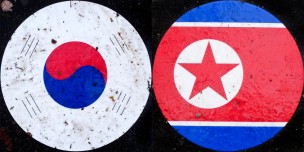Dr. Donald N. Clark, a visting professor from Trinity University in San Antonio, delivered a lecture on the divide in Korea.
Members of the student-run Wesleyan International Relations Association (WIRA) organized a lecture titled “Understanding the Two Koreas,” in an effort to create more of an understanding of the political divide on the Korean peninsula. Dr. Donald N. Clark, Murchison Professor of History and Co-Director of East Asian Studies at Trinity University in San Antonio, Texas, spoke on Thursday, Nov. 6 about both his personal experience in Korea and his profession as a Korean affairs historian. The Adelphic Educational Fund and Wesleyan World Wednesdays also sponsored the talk.
In her introduction for Clark, WIRA co-president Nina Stender ’16 explained how Clark’s interest in Korean affairs developed over the years. In total, he has lived and worked in Korea for over 12 years.
“Dr. Clark’s roots in Korea go back to the early twentieth century when his grandparents and parents were Presbyterian missionaries stationed in Pyongyang, the capital of what is now North Korea,” Stender said. “He grew up in Seoul in the years following the Korean War, during which he witnessed Korea’s struggle to rebuild. He then developed an academic interest in Korean affairs, which evolved into a Ph.D. at Harvard University and a career teaching East Asian history at Trinity in Texas.”
Before delving into his analysis of the current state of affairs in Korea, Clark described his personal connection to the University.
“I’m really, really glad to be back at Wesleyan,” Clark said. “My oldest daughter is a Wesleyan grad and she met her husband here and they were both members of the Eclectic Society…. Their Wesleyan education was the foundation of a very, very productive life.”
He began his talk by presenting the idea that American involvement in Korea’s division is not as significant as is often believed.
“In American history it’s all about us, but actually Korea has a long history of social conflicts within the society that started under the monarchies long ago,” Clark said. “That history was exacerbated by Japanese colonialism and was aggravated again by the war, the Korean War, in the 1940s and 1950s.”
After describing the events leading up to the Korean War, Clark gave an account of his childhood in South Korea when his family moved back in 1954.
“This level of destruction is what I saw when I rode my little bicycle through the blocks, so for 60 years I’ve been watching Korea recover and go from this condition to what it is today,” Clark said, while showing a picture of rubble in Seoul after the war.
Clark depicted the level of destruction that the United States caused within Korea during the war.
“In the north, strategic bombings pulverized, I mean pulverized, Pyongyang, and destroyed the mining and chemical factories,” Clark said. “When we ran out of targets we started destroying their agriculture, bombing dams, and sending rivers of water sluicing down valleys and destroying entire villages.”
Stender said she felt the Korean War as an often overlooked subject that deserves more attention and understanding.
“[WIRA] wanted to hold this event because there seems to be a lack of academic courses or even conversations about the topic of inter-Korean relations, which is an extremely important international relations issue to understand, particularly in light of the growing political and economic significance of East Asia in general,” Stender said.
WIRA co-president Zachary Mintz ’15 said he was very pleased with how the event went and looks forward to holding more events in the future.
“We had a fantastic turnout and hope the event engaged students to think more about international relations and drew interest in future WIRA events,” Mintz said. “We will be hosting Timothy A. Lenderking, a Wesleyan alum, and current Deputy Chief on Mission at the U.S. Embassy in Saudi Arabia in early December to discuss U.S. relations with Saudi Arabia and the Middle East.”
Stender was especially impressed with the personal accounts Clark used to supplement his analysis of the situation in Korea.
“Professor Clark was a fantastic and engaging speaker, who drew from his personal experience growing up in Seoul in the years following the Korean War, during which he witnessed Korea’s struggle to rebuild,” Stender said. “His comprehensive lecture went as far back as addressing the social tensions that existed between the left and the right when Korea was under Japanese rule.”
Clark ended his lecture by describing the unavoidable obstacle faced in attempts to unify the two Koreas.
“In the end the North wants one thing, the South wants one thing, and so we come back to the age-old question-—will the two Koreas ever unite?”

1 Comment
Aaron
I would agree it’s been a strangely overlooked subject, I confess to having little knowledge about it. Nice to have an expert speak about it.